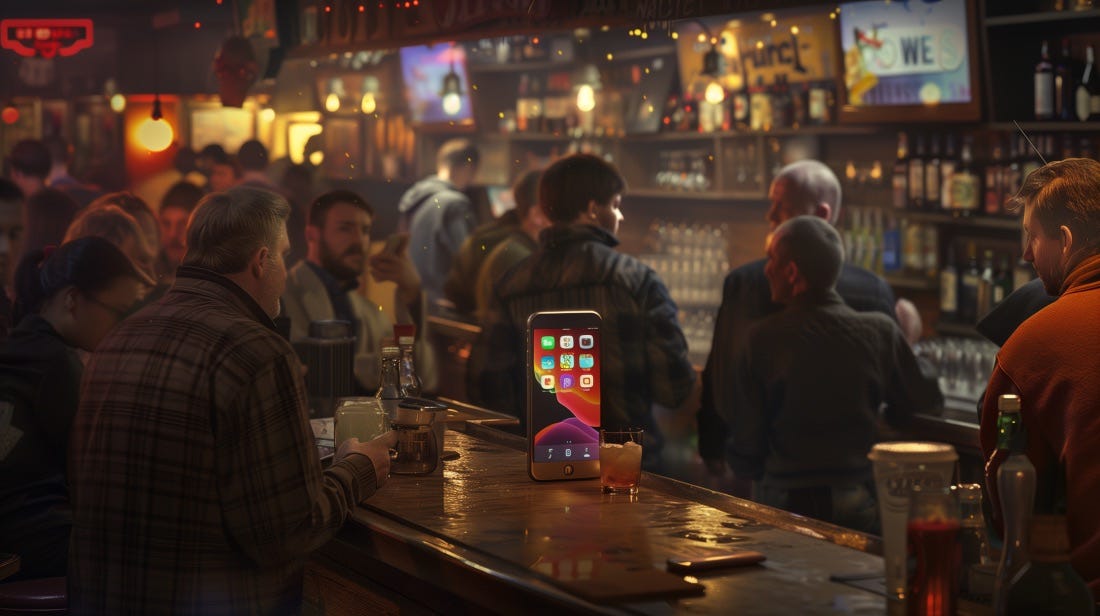The Socials
Welcome to Sinister Phase 2...
I learned recently from several clandestine contacts — okay, I’m making this up, but that doesn’t stop it from being true — that the long initial beta phase of Social Media is close to concluding, and a full production-grade release will drop shortly.
Precisely what form the official Version 1.0 deployment of social media will take remains open to conjecture, but one of my most trusted sources within the Surveillance Capitalism Industry™ (and who is definitely a real person, not just one of the voices in my head) revealed to me that the most ground-breaking feature will be the ability to use the methods and techniques of social media within real life — along with selected other techniques from online existence.
I was able to gain access to a final-beta of The Socials (as they will be known, because it’s chummier and will help you forget how it’s invaded every single corner of your life), and am able to confirm that assertion. I present a few of my initial findings below.
Unsubscribe, and Skip
In future, as with newsletters from that site you long-ago ordered something you now can’t even remember, if a real person in front of you is returning to a well-worn subject, you will be able to say “Unsubscribe”. This will not curtail the current utterance, but should prevent them being able to start it up with you again.
Note: I tried this with my wife and honestly, results were mixed. Not only was her reaction to my using the technique imperfect in terms of friendliness, but she did in fact get into the same subject again the following evening, and the one after that. This is however consistent with attempting to unsubscribe from online retailer newsletters, and so may be a feature rather than a bug.
Related new enhancements of real-life conversation will include being able — if someone is laboring through a long preamble to their point — to say “Skip Intro”. Similarly, should a person be repeating anything (an experience, observation or joke) they’ve told you before, you can say “Skip Recap”. It’s not clear whether the more experimental “Skip Titles” (which enables you to jump over the part when someone arrives, takes off their coat, mutters about the traffic, goes to the bar and buys their first drink, before you can start chatting in earnest) will make the final release.
Something to be aware of however is that, as with Netflix, Amazon Prime and other streamers, speakers will now immediately embark upon the next chunk (or “episode”) of their story, or perhaps an entirely different one that their algorithm (perhaps wrongly) believes you will find interesting, without giving you a chance to consider what you’ve just been told, or withdraw from the conversation entirely. Allegedly there’s a setting somewhere to prevent this, but nobody knows where it is.
Likes & Retweets
If you are in agreement with an observation someone has made in front of you in a social situation, in future you will be able to say “Like” out loud, and that person will receive a palpable sensation of affirmation. Afterwards, other people they encounter may be more drawn to agree with them. This will result in them having more friends, who will in turn be able to give them exponentially more Likes. Eventually they may get so many Likes for everything they say that they no longer notice yours. At this point you are no longer a Friend, but a Follower.
If you strongly agree with the person, you can escalate your response by saying “Retweet” (or in some environments, “Share”). The person will feel very affirmed, and you personally may receive collateral feelings of approbation from people who believe you were smart to repeat what the first person said.
Note: you don’t have to fact-check anything before repeating it to someone else, and indeed are discouraged from doing so. This feature isn’t about the truth value of a statement but rather about whether you enjoyed hearing it. One of the clearest findings of the beta period of social media was that “truth” can cause problematic slowdowns in the spread of opinions, and so it is being phased out.
Something else which became clear during testing is that you will encounter people who are keen for you to Like or Retweet their views, but will never return the favor by doing the same with yours. This appears simply to be because some people are users, and there is presently no patch available.
If you feel that you are not receiving enough Likes as you go through daily life, the advice is to carry a cat with you at all times, because holding up one of those and showing it to people always goes down well.
Mute and block
Two of the more controversial features of this first deployment will be the ability to Mute and Block people in real life.
If you Block someone, then even though you are both in the same space, be it a workplace, living area or public restroom (and will continue to be aware of each other’s existence) neither of you will be able to hear anything the other person says. Both of you will be aware of this situation. However aggrieved the Blocked person may feel, there is nothing they can do about it. They may be drawn to attempt to punch you, but of course won’t be able to see where you are, though they’re certain you’re there in the room. Quite disconcerting.
Should you merely Mute a person, then while you can’t hear what they say, they will be unaware of this fact — and will meanwhile continue to hear what you say. In some ways this is a gentler, albeit sneakier, solution. Uses for it might include dealing with an aunt with stridently stupid political views, or that guy in the coffee shop.
As with everything in life, it can be assumed that users will find ways of using new features in unanticipated ways. As a test, instead of Blocking or Muting a long-term friend who’d been annoying me I simply implied that I might have... by never acknowledging anything they said. Once in a while, however, I’d give them an unimportant Like — thus proving they weren’t in fact Blocked or Muted, and so making it clear that on all the other occasions I was deliberately snubbing them.
This type of Boss Level passive aggression proved genuinely hurtful to the victim, so it’s definitely worth bearing in mind as a tactic.
Exciting times ahead
At time of writing, there remain bugs to be ironed out. One evening when I was in a bar and started doing a short and absurd dance, for example, it appeared that everybody else in the establishment was immediately drawn to replicate it. I cannot confirm this is a genuine feature, however, because on my second attempt I was encouraged to leave by a large member of staff called Kevin.
The current release also works upon the influencer assumption that frequency of contact builds engagement, and so I found myself calling several of my friends every goddamned day until two of them changed their phone numbers. Hopefully there will be the facility to turn this off, or I will feel even more alone.
In conclusion, while some features of The Socials may bring complications to life, others promise a welcome clarity in areas that have been open to doubt. If you’ve been on a first date and you feel it went well, for example — and that you’d like to see the person again — it will now be possible to shyly ask “Like?”
To which the other person will hopefully smile, and say: “Like, and Subscribe”.




Strongly agree. Response escalated. Fact-check overlooked. What are these rivulets running from my optical sensors, these mirth-creases on the face? Surely the signs of archaic human feeling in excess of Like. Nuisance report sent to Tech Support for improving version 2.0.
This whole article is...almost a graphic illustration of the legalisation of ganja in America,a fattie smoked,the next stage is to babble some mad shit,all while consuming a massive amount of chocolate,if it wasn't for half the country going insane and wanting another helping of the mad orange King it might be a good thing.